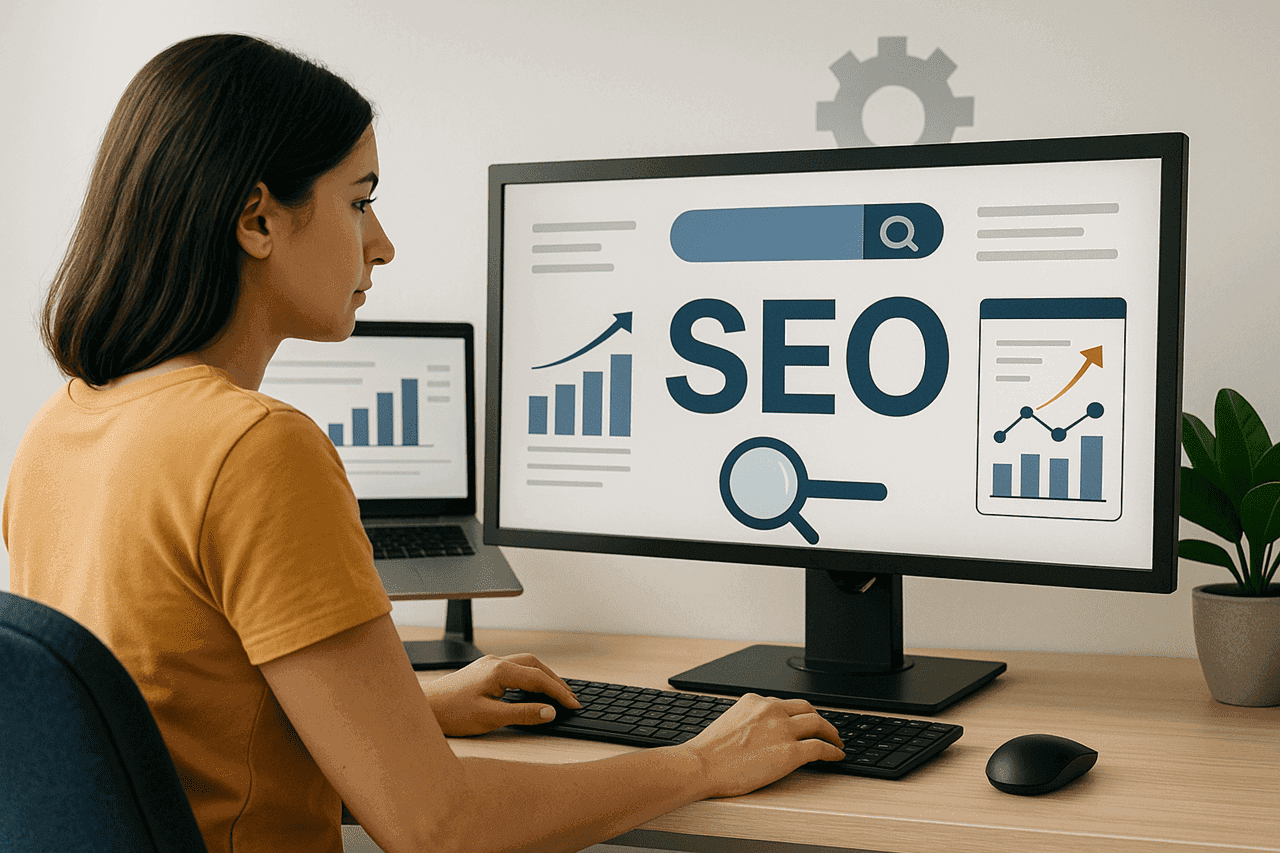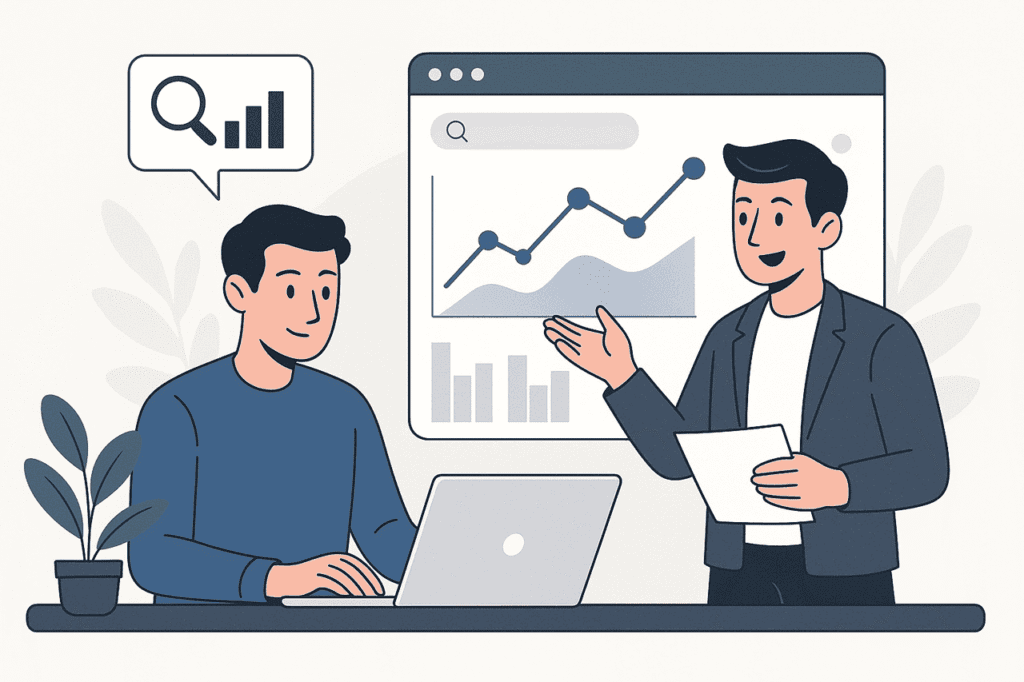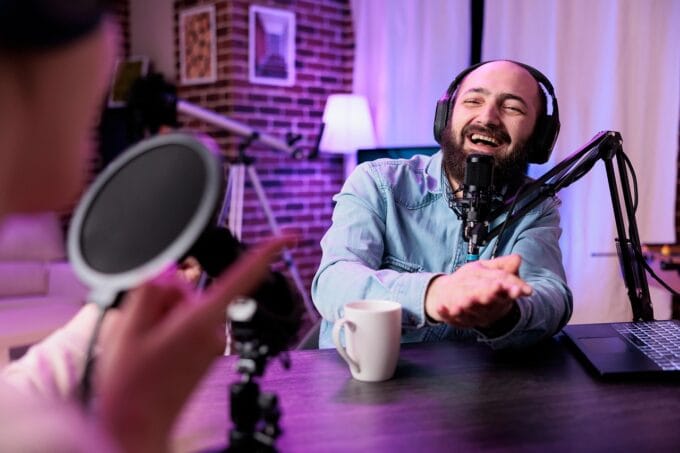Search engine optimization, or SEO, is how you get your website to show up higher on Google, Bing, or other search engines without paying for ads. It’s like making your site the cool kid that everyone notices naturally. I’ll break it down so you can understand what SEO is, why it matters, and how to use it, whether you’re a small business owner, a blogger, or just curious. By the end, you’ll know enough to start, avoid pitfalls, and decide if SEO is worth your time in 2025. Let’s get into it.
What Is SEO and Why Does It Matter?
Imagine you’ve got a killer website, but nobody’s finding it. That’s where SEO comes in. It’s the art and science of getting your site to rank higher on search engines. Why care? Because 68% of people start their online journey with a search.
If you’re not on page one, you’re basically invisible. SEO isn’t just for tech geeks; it’s for anyone who wants more clicks, customers, or readers without burning cash on ads every month.
In 2025, SEO’s more important than ever. Google’s using AI to answer questions directly, and if your site’s optimized, you could land in those fancy AI summaries.
Whether you’re a small business trying to get local customers or a blogger chasing traffic, SEO’s your ticket to being seen. Stick with me, and I’ll show you what it’s all about, how it works, and why you can’t ignore it.
Should You Invest in SEO Now or Wait?
The big question is: should you invest in SEO today or hold off? The answer depends on who you are.
Who benefits from starting now
- Small business owners who need customers from Google searches.
- Content creators who want to build an audience without spending heavily on ads.
- Established companies looking for long-term authority online.
When it makes sense to wait
- Very early-stage businesses with zero marketing budget.
- Brands focused only on short-term campaigns where immediate results matter more than long-term growth.
The balanced view
SEO is like compound interest. The earlier you invest, the stronger the results down the line. Waiting only delays growth. For most businesses, starting now is smarter than postponing.
Bonus: What is the Digital Marketing Strategy that Tracks users Across the web?
Features, Benefits & Rumored Advantages
What Are the Key Features of SEO?
SEO’s got three main pieces, and they all work together to get your site noticed. Think of it like building a house: you need a solid foundation, good walls, and a nice roof.
- On-Page SEO: This is stuff you do on your site—like writing great content, using the right keywords, and making sure your titles and meta descriptions are clear.
- Off-Page SEO: This is about your site’s reputation. Backlinks (when other sites link to you) are huge here. If a popular blog links to your article, Google sees you as trustworthy.
- Technical SEO: This is the behind-the-scenes tech stuff. Fast-loading pages, mobile-friendly design, and clean code make search engines happy. A site that loads in under 2 seconds keeps users from bouncing.
Why Is SEO Important for Your Website?
SEO is important because it helps websites show up in front of people searching for answers, products, or services. Without it, you rely on paid ads or luck. SEO drives trust, traffic, and growth without ongoing ad spend.
Benefits of SEO
- Brings consistent traffic without paying for every click.
- Builds credibility since people trust organic results more than ads.
- Scales with time; content keeps bringing in visitors months or years later.
- Levels the playing field for smaller companies competing with bigger brands.
Risks, Limitations & Uncertainties
What Are Common SEO Challenges?
SEO isn’t a magic button. It takes time—usually 3 to 6 months to see real results. Google’s algorithms change constantly, so what works today might flop tomorrow. Competition’s another hurdle; ranking for “best coffee” is tougher than “best coffee in Smalltown, USA.” A blog I know lost 20% of its traffic after a Google update but bounced back by fixing technical issues like broken links.
Why Do Some Websites Fail at SEO?
Some sites bomb because they cut corners. Keyword stuffing (cramming keywords unnaturally) or ignoring mobile users can tank your rankings. Black-hat tactics, like buying shady backlinks, might even get you banned from Google. Stick to white-hat SEO, focus on quality content and user experience to stay safe.
Why is my website not ranking on Google even though I use SEO?
Usually because of weak backlinks, poor technical health, or targeting the wrong keywords. It could also be new content that Google has not indexed yet.
Comparisons & Alternatives
When deciding on SEO, many compare it to alternatives like PPC, SEM, or social media marketing.
SEO vs PPC
| Factor | SEO | PPC |
|---|---|---|
| Cost | Long-term investment upfront | Pay per click, ongoing |
| Speed | Slow (3–6 months) | Immediate |
| Sustainability | Lasting impact | Stops when budget ends |
| Trust | Higher with users | Often ignored as ads |
SEO vs Social Media Marketing
| Factor | SEO | Social Media |
|---|---|---|
| Reach | Search intent driven | Audience interest driven |
| ROI | Compounds over time | Often short-term |
| Scalability | Global audience | Follower based |
| Control | Google algorithms | Platform rules |
What is the difference between SEO and Google Ads?
SEO earns traffic organically through optimization. Google Ads requires paying for each click. SEO takes time but builds authority, while ads deliver instant but temporary traffic.
Pricing & Buying Strategy
How Much Does SEO Cost?
SEO’s cost depends on how you play it. Going DIY? Free tools like Google Keyword Planner or Ubersuggest cost nothing. Want pro help?
- Freelancers: $500–$2,000 per month.
- Small agencies: $1,500–$5,000 per month.
- Larger agencies: $5,000+ monthly.
Budget depends on goals, competition, and whether you need local or national visibility.
How much does SEO cost for small businesses and what should I budget?
Expect to spend $500–$2,500 monthly for local SEO. Competitive industries can be higher. Always treat SEO as a recurring investment, not a one-time purchase.
Timeline Chart – SEO Strategy Roadmap
- Month 1: Full site audit and keyword research.
- Month 2: On-page optimizations.
- Month 3–4: Publish optimized content.
- Month 4–6: Start link building and outreach.
- Month 6+: Track rankings, improve, and scale.
Case Studies & Real-World Buyer Examples
How Have Businesses Used SEO Successfully?
Real stories show SEO’s power. An e-commerce store selling eco-friendly bags boosted organic traffic 50% by optimizing product pages with keywords like “sustainable tote bags.” A local pizza shop ranked #1 for “best pizza near me” after adding location-based keywords and getting listed on Yelp. Both saw more sales without spending on ads.
Expert Insights & Analyst Opinions
What Do Experts Say About SEO?
SEO pros agree it’s a long game. Rand Fishkin from Moz says, “Focus on what users want, not just what Google wants”. Data backs this up: 75% of people never click past the first page of results. Experts also stress mobile optimization—over 60% of searches happen on phones.
What SEO services should I pay for if I’m just starting out?
Stick to keyword research, content creation, and basic technical fixes. Avoid expensive link packages. Build a solid foundation first.
Privacy, Security & Ecosystem Implications
Are There Privacy or Legal Concerns with SEO?
SEO’s mostly safe, but you gotta play by the rules. Google’s Webmaster Guidelines keep you out of trouble, stick to them to avoid penalties. On privacy, don’t collect user data (like emails) without clear consent, especially in places with strict laws like GDPR. Messing up could hurt your rep or rankings.
What is schema markup in SEO?
Schema markup is structured data you add to your site so search engines better understand your content. It helps with rich snippets like ratings, FAQs, and event details.
Best Practices & Buying Tips
How Can You Start Optimizing Your Website Today?
You don’t need to be a tech wizard to start SEO. Here’s how to kick things off:
- Pick the Right Keywords: Use Google Keyword Planner to find terms your audience searches.
- Write Better Meta Tags: Make titles catchy and under 60 characters (e.g., “Best Coffee in Seattle”).
- Speed Up Your Site: Aim for a 2-second load time using tools like PageSpeed Insights.
- Get Backlinks: Reach out to blogs or local sites for guest post opportunities.
- Track Progress: Use Google Analytics to see what’s working.
These steps are simple but powerful. Start small, and you’ll see results over time.
What are the most common SEO mistakes that keep websites from ranking?
Thin content, slow load times, weak backlinks, ignoring mobile users, and bad keyword targeting are the top reasons.
Future Trends & Predictions
What’s Next for Search Engine Optimization?
SEO’s changing fast. AI-powered search, like Google’s SGE, is shaking things up, your content needs to answer questions directly to show up in AI summaries. Voice search is huge too; by 2026, 30% of searches might be voice-based. Google’s also doubling down on E-E-A-T (Expertise, Experience, Authoritativeness, Trustworthiness), so prove you know your stuff.
Is SEO still relevant in 2025?
Yes. Even with AI search, SEO remains the backbone of online visibility. It adapts but does not disappear.
How will AI change SEO in the future?
AI will prioritize clear, structured answers. Websites with FAQ sections, fact boxes, and trusted authority will show up more often in AI summaries.
Common SEO Questions
Got questions? I’ve got answers. Here’s what people ask about SEO, including stuff they type into AI chatbots like ChatGPT or Perplexity.
What is SEO and why is it important for websites?
SEO means optimizing websites so they show up in search results. It matters because most online experiences start with a search engine.
How long does SEO take to work for a new site?
It usually takes 3 to 6 months to see results. Timelines depend on competition, content quality, and backlinks.
What’s the difference between on-page SEO and off-page SEO?
On-page SEO is about optimizing your site itself. Off-page SEO focuses on backlinks and outside signals.
What is technical SEO and do I need it?
Technical SEO improves how search engines crawl and index your site. Yes, you need it to avoid errors and ranking problems.
Is SEO better than Google Ads for long-term growth?
Yes. Ads stop when you stop paying. SEO builds lasting visibility and trust over time.
What are backlinks in SEO and why do they matter?
Backlinks are links from other websites pointing to yours. They signal authority and help boost rankings.
What is local SEO and who needs it?
Local SEO helps businesses show up in searches tied to a location. Any business with a physical presence should use it.
How do I know if my SEO strategy is working?
Check rankings, traffic growth, and leads generated. Use free tools like Google Search Console.
What is E-E-A-T in SEO?
It stands for Experience, Expertise, Authoritativeness, and Trust. Google uses it to measure content quality.
Is SEO still worth it in 2025?
Yes. It continues to drive organic traffic and works alongside AI search engines.
Why is my website not ranking even though I use SEO?
Common issues are weak backlinks, poor site speed, or targeting the wrong keywords.
What are the most common SEO mistakes?
Not optimizing for mobile, slow site speeds, and ignoring content quality.
SEO builds compounding returns. Social media is often short-term and relies on constant posting.
How much should I spend on SEO?
Small businesses should budget at least $500–$2,500 monthly. Larger companies need more depending on competition.
How long does it take for SEO to start showing results?
Expect 3–6 months for new sites. Older domains with authority may see faster improvements.
Final Thought
SEO is not magic and it is not quick, but it is one of the smartest investments you can make online. Whether you are a small business, a content creator, or an enterprise, understanding what is SEO – search engine optimization will always be the foundation of long-term online growth.





